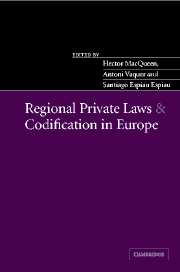Book contents
- Frontmatter
- Contents
- List of contributors
- Acknowledgements
- List of abbreviations
- Introduction
- 1 The civil law in European codes
- 2 ‘A token of independence’: debates on the history and development of Scots law
- 3 The Scottish civil code project
- 4 Scots law in Europe: the case of contract
- 5 Scottish property: a system of Civilian principle. But could it be codified?
- 6 ‘… Quae ad ius Cathalanicum pertinet’: the civil law of Catalonia, ius commune and the legal tradition
- 7 The codification of Catalan civil law
- 8 Unification of the European law of obligations and codification of Catalan civil law
- 9 From revocation to non-opposability: modern developments of the Paulian action
- 10 Epistle to Catalonia: romance and rentabilidad in an anglophone mixed jurisdiction
- 11 Estonia and the new civil law
- 12 The positive experience of the Civil Code of Quebec in the North American common law environment
- 13 From the code civil du bas Canada (1866) to the code civil Quebecois (1991), or from the consolidation to the reform of the law: a reflection for Catalonia
- 14 The evolution of the Greek civil law: from its Roman–Byzantine origins to its contemporary European orientation
- Index
8 - Unification of the European law of obligations and codification of Catalan civil law
Published online by Cambridge University Press: 30 July 2009
- Frontmatter
- Contents
- List of contributors
- Acknowledgements
- List of abbreviations
- Introduction
- 1 The civil law in European codes
- 2 ‘A token of independence’: debates on the history and development of Scots law
- 3 The Scottish civil code project
- 4 Scots law in Europe: the case of contract
- 5 Scottish property: a system of Civilian principle. But could it be codified?
- 6 ‘… Quae ad ius Cathalanicum pertinet’: the civil law of Catalonia, ius commune and the legal tradition
- 7 The codification of Catalan civil law
- 8 Unification of the European law of obligations and codification of Catalan civil law
- 9 From revocation to non-opposability: modern developments of the Paulian action
- 10 Epistle to Catalonia: romance and rentabilidad in an anglophone mixed jurisdiction
- 11 Estonia and the new civil law
- 12 The positive experience of the Civil Code of Quebec in the North American common law environment
- 13 From the code civil du bas Canada (1866) to the code civil Quebecois (1991), or from the consolidation to the reform of the law: a reflection for Catalonia
- 14 The evolution of the Greek civil law: from its Roman–Byzantine origins to its contemporary European orientation
- Index
Summary
Scope and terms of comparison
Scope of comparison: the law of obligations
The topic of the present chapter, ‘Unification of the European law of obligations and codification of Catalan civil law’, has been chosen for several reasons. Firstly, there is the prospect of a future Catalan patrimonial law code, in relation to which the legislative competence of the Catalan Parliament (Generalitat de Catalunya) as regards obligations and contracts will still – presumably – arouse controversy. Secondly, there is the growing importance within Community law of regulations devoted specifically to this matter. And finally, there is the conviction that, in the exercise of its legislative competence, the Generalitat must not only adapt to social reality and adjust to the 1978 constitution, but also embrace the principles that underpin a Community legal system which, little by little, is consolidating progressively.
Terms of comparison
The expressions ‘European law’ and ‘Catalan civil law’ lend themselves to various interpretations, and the first thing is to clarify, right at the outset, their significance.
The expression ‘European law’ is confined to Community law created by and at the instance of the bodies and institutions of the European Union. In the first instance, this means Community directives; but reference will also be made to the Principles of European Contract Law (PECL), drawn up by the Lando Commission, under the patronage of the Commission of the European Community, and endorsed by both resolutions of the European Parliament.
- Type
- Chapter
- Information
- Regional Private Laws and Codification in Europe , pp. 172 - 198Publisher: Cambridge University PressPrint publication year: 2003

